
2_kurs_english
.pdf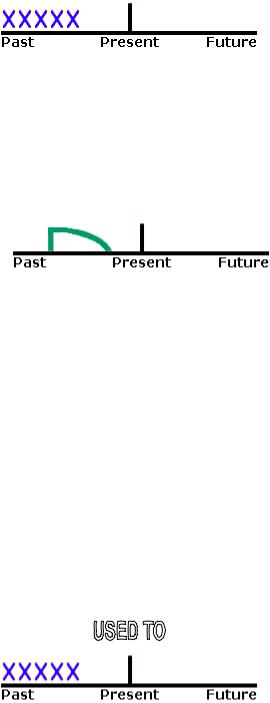
Did you have dinner last night?
Charles Dickens wrote ‘The Pickwick Papers’ in 1837.
How did you learn to drive the car? My father taught me.
Where did you go yesterday evening? I couldn’t reach you.
My friend and I played tennis yesterday. I lost, and my friend won.
B.Habits in the past
I studied French when I was a child.
Did you play a musical instrument when you were a kid?
I picked up English when I was in Britain.
I smoked a lot in my youth. I was a heavy smoker. I gave up smoking a couple of years ago.
C.Actions which happened at a specific time in the past
She studied Japanese for five years.
We talked on the phone for thirty minutes.
A: How long did you wait for them yesterday? B: We waited for one hour.
I lived in America for two years. I lived there from 2000 till 2002.
My mother worked for the pharmacy company in 2005. She quitted the company two years ago..
ACTIVE and PASSIVE
Somebody stole my purse in a bus yesterday. (Active)
My purse was stolen in a bus yesterday. (Passive)
I woke up early in the morning because of a loud noise. (Active)
I was woken up early yesterday morning by a loud noise. (Passive)
We use used to or the past simple for past habits or things which we don’t do any more.
George used to be (was) the best student in class, but now Lena is the best.
I used to smoke (smoked) when I was 20, but then I gave up smoking.
131
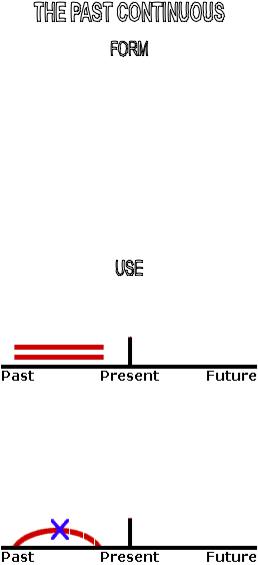
We used to travel a lot when we were students. (traveled)
He used to work hard to make ends meet. (worked)
I used to drink strong coffee when I was a student.
POSITIVE |
QUESTION |
NEGATIVE |
I was playing |
Was I playing? |
I wasn’t playing |
You were playing |
Were you playing? |
You weren’t playing |
She was playing |
Was she playing? |
She wasn’t playing |
He was playing |
Was he playing? |
He wasn’t playing |
It was playing |
Was it playing? |
It wasn’t playing |
We were playing |
Were we playing? |
We weren’t playing |
You were playing |
Were you playing? |
You weren’t playing |
They were playing |
Were they playing? |
They weren’t playing |
We use the Past Continuous for:
A.Two or more actions happening at the same time in the past
They were eating dinner, discussing their plans, and having a good time.
I was studying while he was making dinner.
What were you doing while you were waiting?
We were drinking coffee while our classmates were having an English lesson.
B.A longer action in the past that was interrupted
While we were having the picnic, it started to rain.
While I was writing the email, the computer suddenly broke down.
While John was sleeping last night, someone stole his car.
Somebody called me, when I was sleeping quietly.
C.And an action at a specific time in the past
Last night at 6 PM, I was eating dinner.
At midnight, we were still driving through the desert.
Yesterday at this time, I was sitting at my desk at work.
What were you doing at noon yesterday? Were you at home then?
ACTIVE and PASSIVE
When I arrived somebody was cleaning the office. (Active)
132
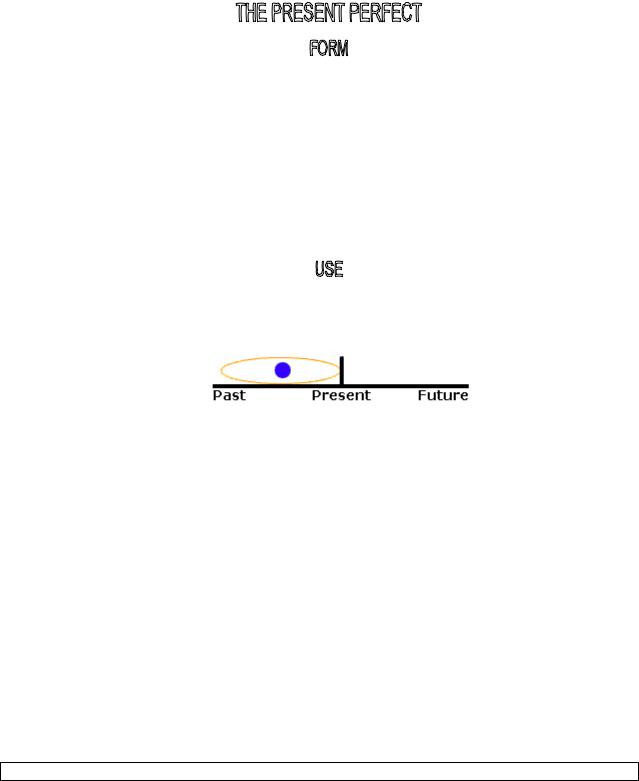
When I arrived the office was being cleaned. (Passive)
When we went to America he was making his new film. (Active)
His new film was being made when we went to America. (Passive)
POSITIVE |
QUESTION |
NEGATIVE |
I have washed |
Have I washed? |
I haven’t washed |
You have washed |
Have you washed? |
You haven’t washed |
She has washed |
Has she washed? |
She hasn’t washed |
He has washed |
Has he washed? |
He hasn’t washed |
It has washed |
Has it washed? |
It hasn’t washed |
We have washed |
Have we washed? |
We haven’t washed |
You have washed |
Have you washed? |
You haven’t washed |
They have washed |
Have they washed? |
They haven’t washed |
We use the Present Perfect for:
A. A past action with a result now
Peter has just failed his physics exam.
I’ve already washed all the clothes and cleaned the flat, and now I’m free.
B. An action which started in the past and continues up to now
Annie is sick. She has had a cold for two weeks. (she still has a cold) I’ve lived in my native city since my childhood. (I still live there)
We’ve worked for the computer company for the last two years. (we still work)
C. To describe an experience
I have been to France.
He has never traveled by train.
D. An action which happened at an unspecified time in the past
I have been to France a few times.
A: Has there ever been a war in the United States?
B:Yes, there has been a war in the United States.
Time expressions with the Present Perfect: just, already, yet, ever, never, since, for etc.
I have just seen the movie on TV.
We’ve already passed the exam.
I haven’t done my homework yet.
Have you finished the work yet?
133
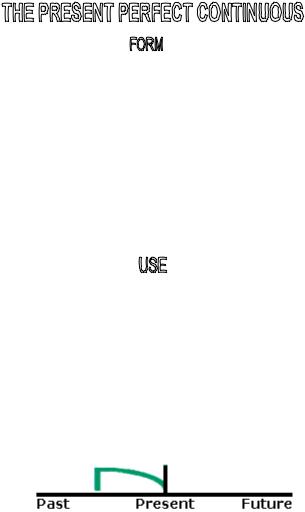
Have you ever been to England? – No, I’ve never been there.
I’ve worked there since 2000, for almost seven years.
See the difference:
My sister has been to France.
She has been to Japan a few times.
My sister has gone to Paris. She works there.
My parents have gone to America. They live there.
ACTIVE and PASSIVE
I have just cleaned the flat. (Active)
The flat has just been cleaned. (Passive)
Many tourists have visited that castle. (Active)
That castle has been visited by many tourists. (Passive)
POSITIVE |
QUESTION |
NEGATIVE |
I have been walking |
Have I been walking? |
I haven’t been walking |
You have been walking |
Have you been walking? |
You haven’t been walking |
She has been walking |
Has she been walking? |
She hasn’t been walking |
He has been walking |
Has he been walking? |
He hasn’t been walking |
It has been walking |
Has it been walking? |
It hasn’t been walking |
We have been walking |
Have we been walking? |
We haven’t been walking |
You have been walking |
Have you been walking? |
You haven’t been walking |
They have been walking |
Have they been walking? |
They haven’t been walking |
We use the Present Perfect Continuous for:
A.An action that started in the past and still continues. We use ‘for’, ‘since’, ‘how long’.
How long have you been doing this work? (you’re still doing)
I’ve been working at this project since yesterday (I’m still working)
We’ve been waiting for our guests for an hour. (We’re still waiting)
B.An action that started in the past and has continued up to now. We might use ‘for’, ‘since’, lately, recently.
She has been watching too much television lately.
You have been running. You look very tired.
I have been waiting here since 2 o’clock. I’m not going to wait any more.
(I’m not waiting any longer)
134
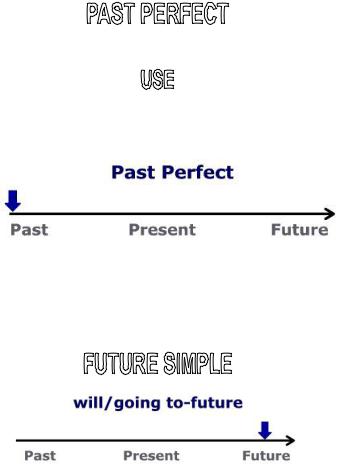
[had been + past participle]
A.We use the Past Perfect for an action which was completed before a special point of time in the past.
We had finished our housework by noon.
They had left the room when the rain started.
We were not hungry. We had had dinner before.
A.We can use ‘will’ to express a future action, when we decide to do something:
I will send you the information when I get it.
I will translate the email, so Mr. Smith can read it.
Will you help me move this heavy table?
B."Will" is usually used in promises:
I will call you when I arrive.
If I am elected President of the United States, I will make sure everyone has access to inexpensive health insurance.
Don't worry, I'll be careful.
C.We use ‘be going to’ to express a plan.
He is going to spend his vacation in Hawaii.
I'm going to be an actor when I grow up.
Michelle is going to begin medical school next year.
Who are you going to invite to the party?
D.We use both ‘will’ and ‘be going to’ to express a prediction.
The year 2222 will be a very interesting year.
The year 2222 is going to be a very interesting year.
John Smith will be the next President.
John Smith is going to be the next President.
135
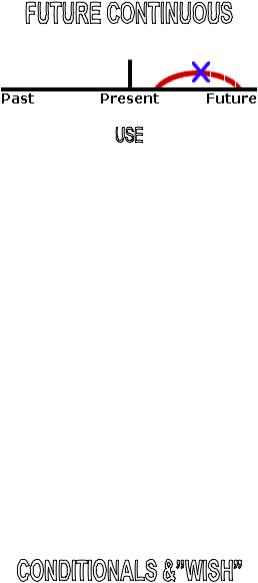
ACTIVE and PASSIVE
John will finish the work by 5:00 PM. ACTIVE
The work will be finished by 5:00 PM. PASSIVE
Sally is going to make a beautiful dinner tonight. ACTIVE
A beautiful dinner is going to be made by Sally tonight. PASSIVE
[will be + present participle]
We use the Future Continuous to indicate:
A.A longer action in the future happening at a specific time.
Tonight at 6 PM, I’ll be eating dinner. (IN THE PROCESS OF EATING DINNER.)
At midnight tonight, we will still be driving through the desert.
B.A longer action in the future which will be interrupted by a shorter future action.
I will be watching TV when she arrives tonight.
I will be waiting for you when your bus arrives.
He will be studying at the library tonight, so he will not see Jennifer when she arrives.
ACTIVE and PASSIVE
At 8:00 PM tonight, John will be washing the dishes. (ACTIVE)
At 8:00 PM tonight, the dishes will be being washed by John. (PASSIVE)
NOTE: Passive forms of the Future Continuous are not common.
ZERO CONDITIONAL
A.When we want to talk about things that are always or generally true, we can use If/When/Unless PLUS present simple or imperative. In the condition clause, there can be a variety of present forms. This is called Zero Conditional.
If you press this button, you get black coffee.
When you fly budget airline, you don't expect to get anything to eat.
Unless he asks you to continue, stop all work on the project.
When I'm working, please be quiet.
136
THE FIRST CONDITIONAL
AWe use the First Conditional to talk about future events that are likely to happen.
If we take John, he'll be really pleased.
If you give me some money, I'll pay you back tomorrow.
If they tell us they want it, we'll have to give it to them.
BThe 'if' clause can be used with different present forms:
If I go to New York again, I'll buy you a souvenir from the Empire State Building.
If he's feeling better, he'll come.
If she hasn't heard the bad news yet, I'll tell her.
CThe "future clause" can contain 'going to' as well as 'will' or other modal verbs such as 'can' and 'must'.
If we don't get the contract, we'll have wasted a lot of time and money.
If I see him, I'm going to tell him exactly how angry I am.
If you go to New York, you must have the cheesecake in Lindy's.
If he comes, you can get a lift home with him.
THE SECOND CONDITIONAL would + verb form
A.We can use the Second Conditional to talk about 'impossible' situations.
If I had one million dollars, I'd give a lot to charity.
If I won the lottery, I'd buy a big house.
If we were in New York today, we would be able to go to the free Elton John concert in Central Park.
B.After I/he/she/it we often use 'were' and not 'was'.
If I were in Tokyo, I'd have sushi every day.
If she were really happy in her job, she'd be working much harder.
C.The form 'If I were you' is often used to give advice.
If I were you, I'd change my job.
If I were you, I'd sign up for Pearson's fantastic English lessons.
THE THIRD CONDITIONAL
Would have + past participle
A.We can use the Third Conditional to talk about 'impossible' conditions, impossible because they are in the past and we cannot change what has happened.
If I had worked harder at school, I would have got better grades.
If I had had time, I would have gone to see him. But I didn't have time.
If we had bought that house, we would have had to rebuild the kitchen.
If we had caught the earlier train, we would have got there on time but we were late.
137

“WISH”
A.We can use 'wish' to say that we would like things to be different from what they are, that we have regrets about the present situation.
I wish I was rich.
He wishes he lived in Paris.
They wish they'd chosen a different leader.
B.In more formal English, we use the subjunctive form 'were' and not 'was' after ‘wish’.
I wish I were taller.
I wish it were Saturday today.
I wish the options were a little clearer.
We use 'can':
A.To talk about 'possibility'.
You can leave your car in that parking space.
You cannot smoke in here.
B.To ask for and give permission. (‘may’ is also possible, but is more formal)
Can I speak to you or are you too busy?
You can use my phone.
C.We use 'can' in offers, requests and instructions.
Can I help you?
Can you give me a hand?
When you finish that, you can take out the garbage.
We use 'could':
A.‘To talk about the past, the present or the future.
When I was living in Boston, I could walk to work.
He phoned to say he couldn't come.
I could see him clearly but I couldn't hear him.
B.'Could' is used to make polite requests. (‘can' is less polite)
Could you help me, please?
Could you lend me some money?
138
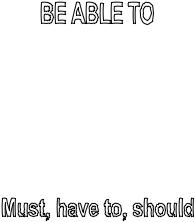
We use 'be able to' instead of ‘can’ to say that something is possible, but ‘can’ is more common:
Students are able to speak a few foreign languages after finishing University. (= student can…)
I wasn’t able to sleep last night. (= I couldn’t sleep)
We will be able to find a better job if we can speak English.
MUST
A.We use 'must' to express a strong obligation.
They must do something about it.
You must come and see us some time.
B.We can also use 'must' to express probability (90% sure). We can also use ‘might’, but in this case we are 50% sure.
There's no heating on. You must be freezing.
It must be nice to live in Florida. (95% sure)
You might be worried that she is so late coming home.
HAVE TO
A.We use 'have to' to express necessity. This usually means that some external circumstance makes the obligation necessary.
You have to pass your exams or the university will not accept you.
I have to send a report to Head Office every week.
I have to arrive at work at 9 sharp. My boss is very strict.
B.The differences between the present forms are sometimes very small. However, there is a huge difference in the negative forms. We use 'mustn't' to express strong obligations NOT to do something.
We mustn't talk about it. It's confidential.
I mustn't eat chocolate. It's bad for me.
You mustn't phone me at work. We aren't allowed personal calls.
C.We use 'don't have to' to state that there is NO obligation or necessity.
We don't have to get there on time. The boss is away today.
You don't have to come if you don't want to.
I don’t have to go. Only if I want to.
SHALL & SHOULD
A.Shall is mostly used in questions to ask for advice or to make offers and suggestions.
Shall I open the window?
139
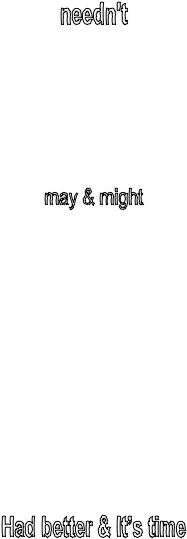
Shall we start the meeting?
What time shall we start?
B. Compare shall I…? & will you?
Shall I carry these heavy bags? (do you want me to carry them) Will you carry these heavy bags? (I want you to carry them)
SHOULD
A. We use 'should' for giving advice.
You should speak to him about it. You should see a doctor.
You should ask a lawyer.
A.We can use 'needn’t' to say that it is not necessary to do something:
You needn’t hurry. The classes start at 2’clock.
We needn’t cook, as we are having a meal out tonight.
B.Instead of ‘needn’t’ we can also use ‘don’t need to, doesn’t need to’:
We don’t need to hurry, as we have plenty of time.
You don’t need to take your umbrella. It’s stopped raining.
A.We can use 'may' to ask for permission. However this is rather formal and not used very often in modern spoken English.
May I borrow your dictionary?
May we think about it until tomorrow?
B.We use 'may' to suggest something is possible.
Philip may come to stay with us
I may not have time to do it straightaway.
It may snow later today.
C.We use 'might' to suggest a small possibility. There is in fact little difference between ‘may’ and ‘might’. 'Might is more usual in spoken English.
It might rain this afternoon.
She might be at home by now but it's not sure at all.
I might not have time to go to the shops for you.
A.I’d better do something means it is advisable to do it.
You’d better go. Otherwise you will miss the last bus.
We’d better work hard now not to fail our exams.
B.Had better is similar to ‘should’, but not totally the same. We use ‘had better ’ for this particular situation, and we use ‘should’ to give advice in all situations:
You look very tired. You’d better have a rest.
It’s rainy and wet outside. I’d better put on a raincoat and take an umbrella.
To be healthy we should eat more vegetables and fruit.
140
